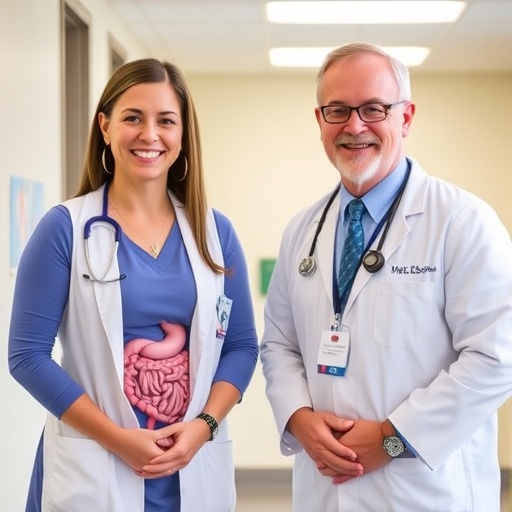
In the evolving landscape of breast cancer treatment, patient well-being extends far beyond the initial success of eradicating malignancy. A recently published longitudinal study in BMC Cancer sheds new light on how different cancer therapies influence long-term psychological health and overall quality of life for breast cancer survivors, revealing critical insights needed for holistic patient care. Over a span of 48 months post-treatment, the study meticulously tracked mood disorders such as depression and anxiety, fear of cancer recurrence, pain experiences, and the broader quality of life metrics, navigating the intricate aftermath of surgery, chemotherapy, and radiotherapy.
Breast cancer survival rates have markedly improved over the past few decades due to rapid advancements in early detection and multimodal treatments. However, this improved survivorship has brought attention to the chronic psychosocial burdens faced by patients long after treatment concludes. This study captures the trajectory of key psychological outcomes and quality of life in 143 women treated for breast cancer, providing a nuanced temporal analysis over a four-year post-treatment period. Such longitudinal data are invaluable for understanding how initial therapeutic choices reverberate through patients’ lives.
Researchers employed widely validated instruments to assess mental health and well-being, including the Patient Health Questionnaire-9 (PHQ-9) for depression, General Anxiety Disorder-7 (GAD-7) for anxiety, the Fear of Cancer Recurrence-7 (FCR-7) scale, the McGill Pain Questionnaire – Visual Analog Scale (MPQ-VAS) for pain assessment, and the World Health Organization Quality of Life Brief Questionnaire (WHOQOL-BREF). These tools were administered at baseline upon treatment discharge, and at 12, 24, and 48 months thereafter, allowing for a comprehensive mixed model repeated measures analysis that unveiled subtle yet significant trends.
The study demonstrated a remarkable general trend of improvement in psychological parameters over time. Depression severity, as measured by PHQ-9, decreased significantly from a mild level at discharge to a minimal level after four years. Anxiety symptoms followed a parallel downward trend, highlighting the natural alleviation of acute treatment-related distress as patients adjust to survivorship. Notably, fear of cancer recurrenceâa pervasive concern that often fuels ongoing psychological morbidityâalso diminished over the observation period, albeit remaining at a moderate level, underscoring its resilience as a psychological stressor.
Pain, a complex and multifactorial consequence of cancer therapies including surgery and radiation, showed a modest reduction over time, reflecting perhaps the resolution of acute treatment-related discomfort but also pointing to the persistence of some degree of chronic pain syndromes. This factor continues to challenge clinicians seeking to balance oncologic efficacy with preservation of function and comfort in survivors. Alongside these findings, self-reported quality of life scores improved notably during the first year post-treatment and stabilized thereafter, indicating a period of adjustment followed by maintenance of well-being.
A particularly compelling facet of the research was the comparative psychological impact of surgical modalities. Women undergoing complete mastectomy exhibited persistently higher anxiety levels than those treated with partial lumpectomy, even four years after surgery. This finding highlights the profound influence of surgical extent not only on physical but also on mental health outcomes. The data suggest that radical surgical approaches may engender lasting psychological distress, emphasizing the importance of comprehensive pre- and post-operative counseling and targeted interventions.
The complex interplay between cancer treatments and long-term psychological well-being revealed in this study challenges oncology providers to expand survivorship care beyond surveillance for recurrence. Tailored mental health support, early identification of at-risk patients, and integrative pain management are essential components to enhance overall survivorship experience. The gradual improvements in depression and anxiety underscore potential windows for timely psychosocial interventions, particularly within the initial year post-treatment when quality of life rises yet remains vulnerable.
While improvements in fear of recurrence over time offer some reassurance, the persistence of this fear indicates a critical area for continued psychological research and support services. Cognitive-behavioral therapies and mindfulness approaches targeting FCR may hold promise in mitigating this enduring concern. Moreover, the differential impact of surgery types on anxiety suggests that patient-centered decision-making around treatment options should integrate considerations of long-term mental health to optimize outcomes.
The methodology employedâlongitudinal, prospective data collection with validated metrics at multiple time pointsâprovides robust evidence to inform clinical practice. Such designs enable detection of temporal trends and treatment-specific effects that cross-sectional studies cannot capture. Furthermore, mixed model analyses allow adjustment for confounders and missing data, enhancing the reliability of findings that could help shape survivorship guidelines on psychological monitoring and rehabilitation.
Given the relatively young mean age (approximately 42 years) of participants, this study holds particular relevance for understanding the impact of breast cancer treatments on women in midlife, a phase often complicated by multiple social and professional roles. The psychological sequelae of treatment choices in this demographic may cascade into broader domains such as familial functioning and work productivity, reinforcing the imperative for holistic survivorship care models.
Future research trajectories should explore mechanistic underpinnings linking specific treatment modalities to sustained psychological distress, potentially involving neuroendocrine, immunologic, and psychosocial pathways. Additionally, expanding cohort diversity and incorporating qualitative assessments could further illuminate personalized survivorship experiences. The integration of digital health tools for symptom monitoring and psychoeducation may also enhance intervention delivery over extended follow-up periods.
This studyâs revelations underscore a paradigm shift in cancer care philosophyâsuccess must be measured not solely by tumor remission but also by sustained life quality and psychological resilience. The findings compel oncologists, mental health professionals, and policymakers to collaborate on embedding mental health assessment and support as standard components of breast cancer survivorship programs. Attention to nuanced patient experiences will catalyze development of interventions that proactively address long-term sequelae.
Ultimately, comprehensive breast cancer care hinges on recognition that the shadow of cancer lingers beyond physical remission. This research spotlights the necessity of long-term surveillance not just of tumor markers, but also of evolving mental health dimensions and patient-reported outcomes. By placing survivor-centric quality of life at the forefront, the study charts a course toward more compassionate, effective, and personalized post-cancer care strategies.
As breast cancer treatments continue to evolve, with emerging modalities such as targeted therapies and immunotherapy, ongoing assessment of their psychological impacts will be paramount. The data reported here can serve as a foundation against which future treatments are evaluated not only for survival benefit but also for their mental health footprint. Enhanced survivorship longevity demands that healthcare systems prioritize enduring psychological and functional recovery.
Clinicians are encouraged to incorporate routine psychological screening using tools like PHQ-9 and GAD-7 into follow-up visits, enabling early detection of distress and timely intervention. Collaboration with psycho-oncology specialists can facilitate tailored care plans addressing issues such as persistent anxiety in mastectomy patients. Addressing pain management with novel analgesic strategies and integrative therapies will further contribute to enhancing quality of life.
In summary, this landmark study paints an encouraging yet cautionary portrait: breast cancer survivors generally experience decreased psychological symptom burden and improved quality of life over time, yet significant individual differences related to treatment type persist. Such insights equip the oncology community with actionable knowledge to refine survivorship care frameworks, emphasizing the vital blend of physical cure and mental health preservation for sustained wellness.
Subject of Research: The long-term psychological outcomes and quality of life in breast cancer patients following different cancer treatment modalities.
Article Title: The influence of cancer treatments on long-term psychological outcomes and quality of life in breast cancer patients.
Article References:
Yang, Y., Zhao, Y., Yao, K. et al. The influence of cancer treatments on long-term psychological outcomes and quality of life in breast cancer patients. BMC Cancer 25, 1403 (2025). https://doi.org/10.1186/s12885-025-14667-y
Image Credits: Scienmag.com
DOI: https://doi.org/10.1186/s12885-025-14667-y
Tags: advancements in breast cancer therapiesbreast cancer treatment impactchronic psychosocial burdens in breast cancerfear of cancer recurrenceholistic patient care in oncologylongitudinal study on cancer survivorsmental health assessment in cancer treatmentmood disorders in cancer survivorspsychological health of breast cancer survivorsquality of life post cancer treatmentsurvivorship and mental well-being




